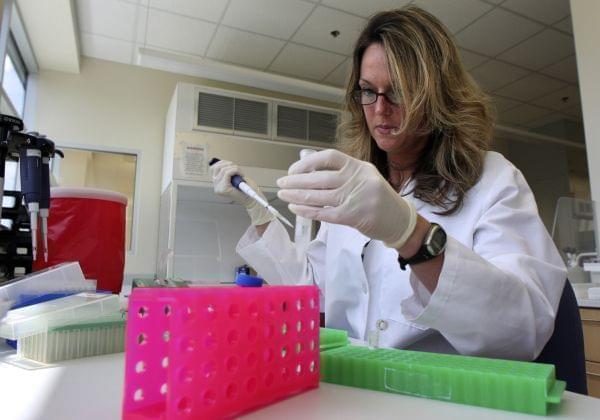Illinois’s DNA Testing Backlog; Golden Apple Scholars; Books Returned To Danville Prison; Chicago Defender Ceases Print

The amount of DNA evidence being submitted to the Illinois State Police crime lab in Chicago has increased dramatically in recent years, creating delays that are causing some people to wait in jail or with ankle monitors for test results. Al Goldis/AP
Prosecutors and police officers have been sending too much DNA to the Illinois State Police crime lab. People are waiting in jail as a result of the massive backlog. Plus, schools across Illinois badly need more teachers. One statewide program has been trying to recruit more of them, as early as high school. Also, earlier this year a prison in Danville removed 200 books from an education program library. But now, after public pressure, the books are back in the prison. And after more than a century, the Chicago Defender will no longer be available in print.
There aren’t enough teachers in Illinois. This has been a problem for years: one survey by the Illinois Association of Regional Superintendents of Schools found that one in five positions last year were unfilled.
Legislators have proposed and passed some measures that they hope will help, like a new funding formula for public schools and an increase in the minimum teacher salary. But there are also programs across the state that have been trying to help fill this gap for years.
One of them is the Golden Apple Scholars program. You might know that name because it’s also the organization responsible for the Golden Apple Award, which honors excellent teachers in our state.
The Scholars program provides, among other things, scholarships, support, and mentorship for students who are planning to become teachers, and they’re recruiting for another cohort right now.
Wanda Mendoza is a director at one of Golden Apple’s sites at Northern Illinois University. She also teaches third grade at Chicago Public Schools. Akeelah Taylor is enrolled at that site at NIU, where she’s also a rising junior.
"Your first year of teaching is very stressful... you start off and you're very excited but you might lose your way," says Akeelah about #teacherburnout.
— The 21st (@21stShow) July 11, 2019
She's being taught to take time to herself and reach out to others."You don't have to do it all by yourself."
Plus--
The amount of DNA evidence being submitted to the Illinois State Police crime lab in Chicago has increased dramatically in recent years.
In part, it’s because too much evidence is being collected, and sometimes that evidence that isn’t even relevant to a particular case.
WBEZ reporter Patrick Smith has been following this DNA backlog at the Illinois State Police, and how this backlog is creating delays that are causing some people to wait in jail or with ankle monitors for test results.
.@pksmid says the #DNAbacklog has a major effect on survivors:
— The 21st (@21stShow) July 11, 2019
"They're going to court dates, they sometimes have to testify and are reliving this trauma... They can't move past it because they're still caught up in the legal process."
Also--
In May, the Illinois Newsroom reported that 200 books were removed from a prison education program library at the Danville Correctional Center. Most of those books had one thing in common: they were about race.
There’s been a lot of pressure on the Illinois Department of Corrections when it comes to books in prisons, both before and after this story broke. One advocacy group is suing IDOC for censorship. Some authors of the removed books spoke out as well. And just this past Monday, state lawmakers held a hearing in Chicago on this very issue.
There’s been another recent development in this story: staff at the prison education program say all of the books have been returned to their library. And the new director of the state Department of Corrections says the agency plans to review its policy on which books are allowed in prisons.
Lee Gaines is the Illinois Newsroom reporter who originally broke this story.
"I wasn't prepared for the public response. It went somewhat viral and it spread across the country," @LeeVGaines says about the response to her reporting.
— The 21st (@21stShow) July 11, 2019
She says it ranged from sadness to outrage.
And--
On Wednesday, the last print edition of The Chicago Defender hit newsstands. After more than a century, the influential African American newspaper will be shifting to a digital only format.
Over its run, The Defender featured pieces from writers like Langston Hughes and Gwendolyn Brooks and was an important voice in the fight for African American rights and civil liberties.
With the help of the Pullman railway Porters who spread the Defender along their routes, the paper reached a national audience and was an integral part of bringing more African Americans to the North during the Great Migration.
Ethan Michaeli is a former Defender staffer and the author of The Defender: How the Legendary Black Newspaper Changed America. Glenn Reedus is The Defender's former executive and managing editor.
"It's really like a relative being lost," @reedusreasons1 says about the final print edition of the @ChiDefender.
— The 21st (@21stShow) July 11, 2019

